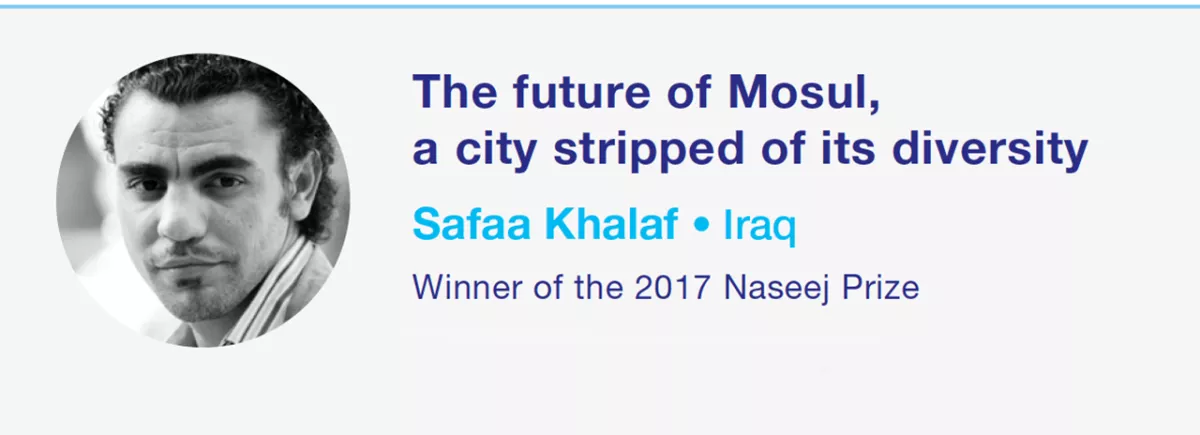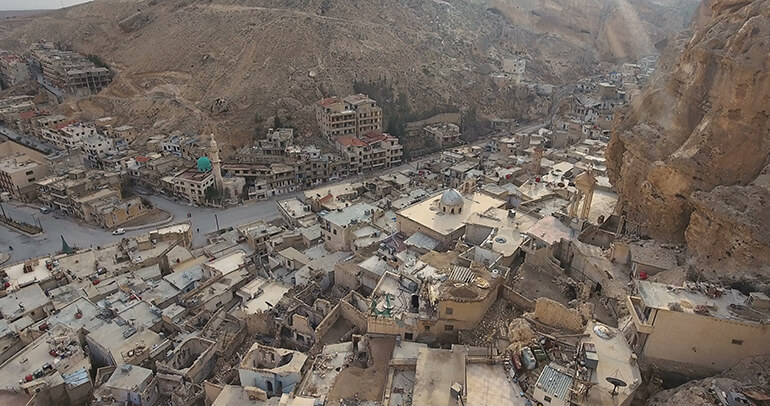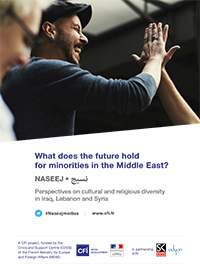
The future of Mosul, a city stripped of its diversity
Related project
NaseejDiscover a selection of the best articles dealing with cultural and religious diversity in the Middle East, entered in the Naseej competition launched by CFI and SKeyes in October 2017.
This week, the winner of the
2017 Naseej Prize, the iraqi journalist Safaa Khala, reports on the recent liberation of Mosul by focusing on the future that awaits it.
Published in
Assafir Al Arabi on July 13, 2017.
Mosul is one of the cities that has suffered the most drastic demographic change, owing to its position which, over the course of history, has been the focal point for wars in the region. Its geographic location has indeed played an important political and economic role and has always made it a province much coveted by the major powers, right
up to June 2014, when it fell into the hands of the terrorist organisation, Daesh. In addition, for centuries Iraq has historically been one of the largest areas of conflict in the Middle East to have suffered demographic changes and mass displacement of its people.
The rupture of the social contract
Over the course of successive occupations, Mosul has been stripped of any belonging, way of life and cultural identity and adopted the characteristics of its “new conquerors". These political changeovers through time, and this unstable time axis have altered the city's geographic functions politically, economically, culturally and even in terms of religious persuasion. Consequently, it cannot be said that a certain “ethnic group" or “community" originates from Mosul itself; with each new invasion, the city's residents assimilated new groups. This process formed new communities that took advantage of old cultural and social identities or eliminated them in order to develop new cultures which, in turn, were often subsequently swept away by new colonisers. With each change, the residents of the city and its surrounding area paid a heavy price in blood, displacement, death, exodus, life under an embargo and, most often, permanent exile, as seen in the latest bitter experience with Daesh.
The idea of sovereignty forced the Iraqi government to conduct a military operation to regain control of Mosul. This operation was the new Iraqi political regime's greatest task since 2003. However, at the point when the city fell in 2014, the contrast lay between the lack of human, military and logistical potential within the ranks of Daesh and the resources available to the Iraqi government and Peshmerga forces at the time. Admitting to this contrast does not mean admitting to the power of the terrorist organisation, but rather means emphasising the unknown factors in the fall of Mosul. These factors still remain obscure today, following the recapturing of the city (the Iraqi forces managed to regain total control of the eastern and western districts of the city on 8th July this year). . What happened, in reality, was the shattering of all relations forming the very notion of ''city'', and its dependency with regard to the ''homeland'' as a geographic, political and cultural cradle. This profound loss of confidence in the political regime can be explained by the dismantling of domestic relations that historically united the various elements in the city in a form of togetherness. Added to that, was the decline in the residents' social awareness of the importance of preserving the cohesion and pluralism that shaped Mosul's identity over the course of history.
The most dangerous factor in the fall of Mosul was the rupture of the social contract between the city's various elements. The pillar of civic stability was thus knocked down, to be replaced with frightening walls, leaving Mosul residents cut off from each other, based on a political and sectarian separation, regional distinctions and marked social inequalities, all in the absence of any sense of national belonging. Highly sensitive and damaging factors were dismissed in favour of the immediate political factor. The country's other crises were thus obscured, leading to muddled thinking about the triggers for the fall of Mosul.

Accusations of betrayal in the face of a rebellion
In 2005, at the time of the first legislative elections as part of the “transition to democracy", Mosul's Sunni Arabs boycotted this initiative, which engendered an unconvincing political response: the Kurdistan Alliance won 31 seats in the federal parliament, out of a total of 41 seats. The same happened on the province's administrative council, dominated by the Kurdish group. However, the percentage of Kurdish citizens (including in the contested regions), did not exceed 20%. The Sunni boycott, the whole protest vote and refusal of the Iraqi government, USA and region to hold new elections in the aim of avoiding further complications on the political scene, reinforced a distorted political reality. The results of this suicidal decision emerged throughout the following ten years. Following the violent and unforeseeable shock they had suffered with the collapse of the old regime, many of Mosul's Sunni Muslims sank into a spiral destined for failure. It cannot be said that the city's residents lent absolute allegiance to the regime, but Mosul was one of the country's nationalist, religious bastions, not to mention its loyalty to the military elite ever since the Iraqi army was first set up in 1921. With the decision to dissolve the Iraqi army, this elite was implicitly accused of betraying the new regime and sentenced to exclusion. And yet it would have been possible to contain the nationalist anger of the Mosulites and military elite by dealing with the city's complex social structure through a process that respected its specific characteristics and its importance, with a view to reintegrating it into the new regime at national level.
The violent Sunni rebellion began on 21st April 2003, when the forces of the 5th contingent of the old Iraqi army abandoned their positions in Mosul, without any military confrontation with the American army (a scene similar to the fall of Mosul under al-Maliki), and continued right up to the creation of Daesh and the proclamation of the ''Caliphate of Islamic State''. This scandalous retreat was, in fact, a tactical retreat to direct the rebellion in the years to come. Mosul experienced, then, a sudden reversal of forces, moving from the protection of a fallen regime to confrontation with the current regime. But this reversal did not mean, however, that these forces would remain loyal to the old, dismantled regime. The army's Mosul experience helped steer the rebellion (at least in Mosul city), then much coveted by armed, often radical Islamist groups or those of a less extremist tendency, under the veneer or Arabism and nationalism.
Dismissing this military elite under the pretext of its relations with the old regime and eradicating it by describing it as “blindly loyal" to that regime was a serious error on the part of the new regime. The price to pay was an intense eight-month battle against the terrorist organisation. This battle caused considerable damage, including a grave humanitarian crisis, with displacement on a historic scale of the indigenous population and the elimination of a civilisation. . The former head of government, Nouri al-Maliki, was held responsible for the failure of the policy of containment adopted in the preceding years. In fact, through his sectarian leadership, he transformed Mosul into barracks dominated by corrupt soldiers and he opposed local political forces, without really taking into account the city's weight on a national scale, nor measuring the danger posed by the outbreak of the rebellion of which Daesh would take advantage.
The eradication of diversity
In 1800 BC, Mosul was known to be a city inhabited by a pagan population. It is thought that its name, ''Ninuwa'' (Nineveh in English) came from its original founder, the Assyrian leader, ''Ninus'', according to accounts given on papyrus fragments by the Greek historian, Ctesias who was also physician to the Achaemenid king, Xerxes II.
However, the name Mosul is linked to a devastating event: in 612 BC, the Assyrian Empire collapsed at Nineveh and the ruined city inherited the name of ''Machpel". The pronunciation of this name evolved through the accent of the Greeks occupying the city and became ''Mospila''. With successive invasions and various dialects, this name turned
into ''Mousseline'' to finally become ''Moussel'' (known in English as ''Mosul''). But the name's connotation remains, as in any mythological explanation, linked to ''destruction''.
After an eight-year battle with Daesh, all that remains of the old Mosul are the ruins of an annihilated city, stripped of the characteristics of its culture, history and civilisation. Blamed on the deliberate vandalism carried out by the terrorist organisation and the relentless violence of the fighting between the liberating forces and the forces of oppression.
The direct consequence of the violent storms and wars that rained down on Nineveh was the ruthless eradication of its cultural and civilisational diversity. Dates have been identified indicating when the Sassanids resorted to atrocious massacres to punish the Christians of Mosul. Following a series of successive defeats against the Byzantines,
Shapur carried out a violent purge of the Christians at Nineveh between 341 and 346 AD. He executed Bishop Simeon bar Sabba'e and thousands of those faithful to the church. Was this, perhaps, the first brutally abusive treatment of Mosul's minorities?
This scene was repeated with the city's Christians, but not extending to genocide. It was Daesh that took over, ordering the forced displacement of Christian citizens and the confiscation of all their property and personal effects. In addition, their houses were marked with the Arabic symbol '' ن'' (letter “N") standing for ''Nazarenes'' and were, from then onwards, deemed the property of Islamic State. On 20th August 2014, for the first time in eighteen centuries, the bells of the churches in Mosul ceased to ring out. Since then, the fate of these churches has been nothing but explosions and a change in their identities: they were turned into mosques, were looted or shut down.
The Yazidis were also cruelly treated by Daesh. They were the victims of atrocious ethnic cleansing, with the massacre of a great many of them and abduction of their women. The latter became members of the terrorist organisation's harem and reduced to sexual slavery. They were violated physically and culturally, and some of them were forced to convert to Islam owing to the extremist Takfiri interpretation of apostasy. Another terrible tragedy occurred on Mount Sinjar (35 km from Mosul), where Yazidis who had gathered there to escape from Daesh succumbed to disease, famine, thirst and, in some cases, committed suicide. This was the ninety-ninth tragedy in the history of Iraqi Yazidis, all still etched in the community's consciousness through the recounting of sorrowful sagas, poems and legends.
Although deeds perpetrated by the IS organisation against Shia Turkmen have still not been revealed, they are undoubtedly no less atrocious, as Daesh designated them ''Rafidites'' and therefore direct enemies of the organisation.
Taking the theory of its caliphate as its basis, Daesh emptied Mosul of its diversity. It transformed this civilised city into a closed, monolithic society, imposed Sharia law on the Sunni citizens and caused a deep hatred to take root that will continue to inflict heavy consequences on the city. These are just the result of certain residents' support for the behaviour of Daesh towards their fellow citizens from other communities with whom, however, they had lived in coexistence for decades or even centuries. Violence and Takfirism rained down on the historic social balance, thus sweeping aside the spirit that used to be the driving force of Mosul. This city, whose resilience has left its mark on history, was finally crushed on a Mount Sinjar rock.
Christians, Yazidis, Shia Turkmen, Shabaks and a small group of Sabean-Mandeans would never have imagined enduring such trials at the hands of their compatriots, working with Islamic State. The result of these confrontations produced a profound social shock and the collapse of a weak trust that had formed a bastion during the last fourteen years. This crisis turned into a horrible nightmare, uprooting those residents of Mosul whose accents were different from other Iraqi accents, or based on their cultural or historic characteristics. They were expelled from their city, left without any history, without an identity or a past, and without any hope, given that their present existence amounts to a life spent in camps, forced displacement, exile and massacres.
The impossibility of repatriation
Iraqi government hopes for and is counting on the repatriation of displaced persons originally from Mosul who are currently living in camps and towns in Kurdistan, or in other regions of Iraq. But this appears to be an impossible task, given the scale of damage to the city and the difficulty of repatriating displaced persons in districts that have been destroyed, without any services or any sign of them being re-established in the near future. The hardest and riskiest problem concerning the future of the city, is convincing the Christian, Yazidi and Shia Turkmen citizens to return to Mosul. It appears this may be a sizeable obstacle as the latter broke all ties with Mosul when they left. Besides being humiliated, indignant and wounded by the loss of their close family members and property, their cultural, historic and religious heritage was also destroyed. In reality, this refusal is synonymous with a Mosul stripped of its roots and a secure future and of the cultural diversity that used to characterise it. It is probably possible to restore the mosques, churches, monasteries and even archaeological sites, but will it be possible to restore the spirit of belonging to these places? Will it be possible to re-establish trust and confidence in coexistence?
Not even the Sunni spirit of Mosul escaped alienation, a spirit that had given birth to a moderate intellectual heritage, had composed an Arabic melody of modern, peaceful notes and created the most beautiful ''mouwachah'' (traditional songs). Unfortunately, Takfirism, which consumed the entire region with a purging fire, also destroyed Mosul's religious heritage and the patriotic heritage of the Nahda, bequeathed by the left and Arabic nationalism. Today, Mosul is facing the consequences of the hatred and extremist values instilled by the application of Takfirism within its society.
Retaliation
The new generation will grow up detached from the city's flourishing past and its civilisation. The only link that will remain engraved in their consciousness will concern the tragedies rooted in their very being, the devastation before them and a traumatic psychological experience. When the families try to remember the Mosul where they once lived, they talk of it like an imaginary paradise that cannot have any tangible reality for a generation that has become disintegrated through wars, massacres, abuse of power and religious intimidation.
There is a fear of retaliation from society as a natural counter-reaction to the shock suffered. People then question the Iraqi state's ability to maintain stability in the liberated cities and to rehabilitate their citizens, having lived for three hard years in the grip of extremist Takfirism which devoted itself, with all its might, to destroying society's civil and cultural foundations. If the government is unable to rebuild the city and erase the traces of the war and of Daesh as quickly as possible, the destruction left by the fighting, the absence of basic services, the political rivalries and tension between communities will remain strongly in the minds of the people who were displaced and those who remained in Mosul. The psychological repercussions will fuel further frustration that could be exploited regionally and create “a breeding ground for a new, even more radical version of Daesh…
Mosul continues to be the weak link" that may cause the chain to break once again. The city went through a bitter experience, the repercussions of which will affect the future of an Iraq ravaged and plagued by unpatriotic ambitions.
Find the ten finalists of the Naseej competition in the booklet What does the future hold for minorities in the Middle East?



